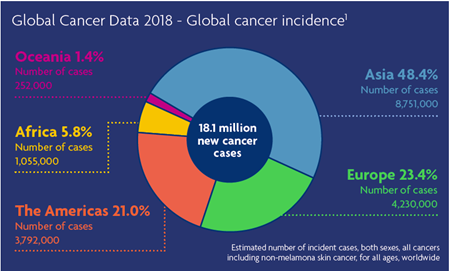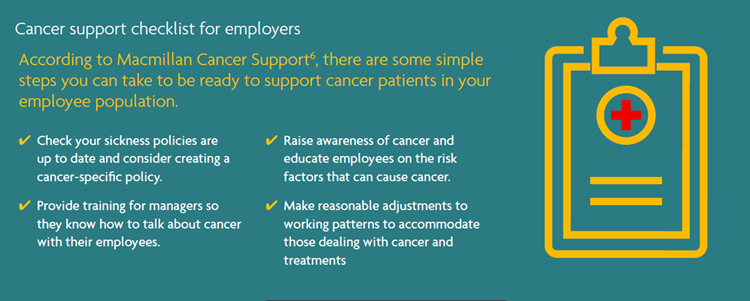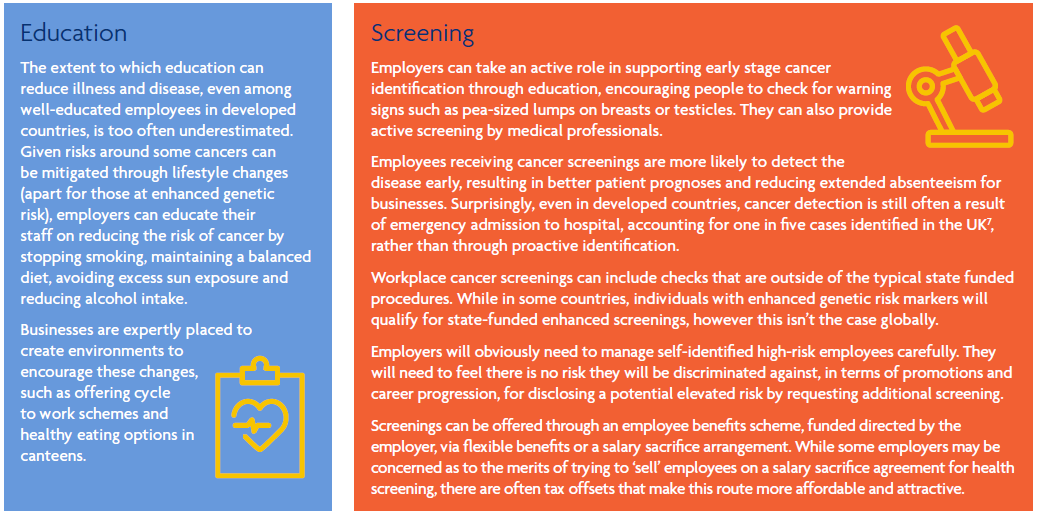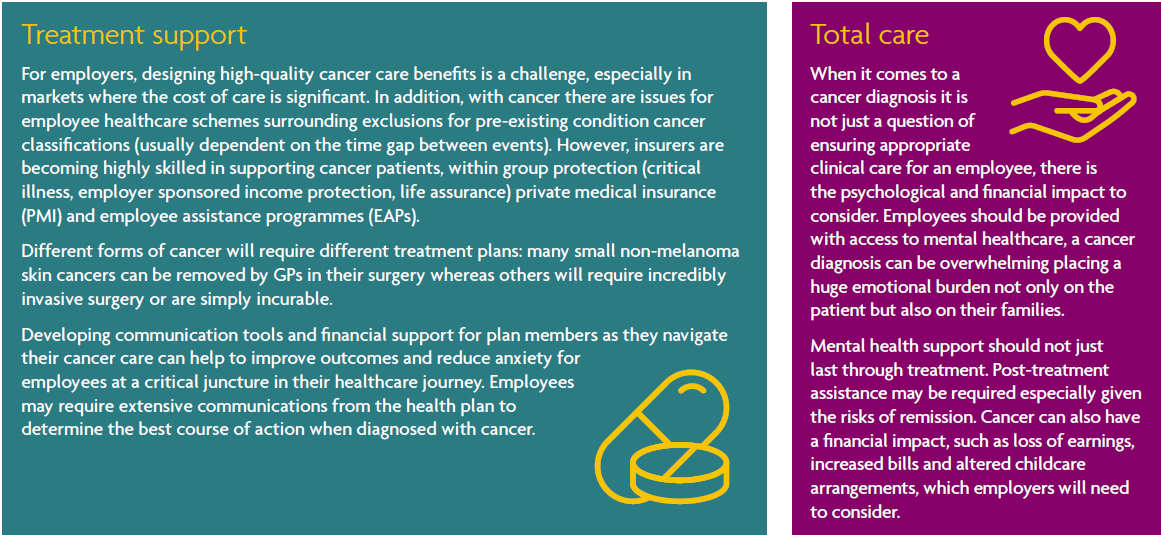NEWS
Friday 28 September 2018
Cancer remains one of the world’s deadliest diseases and accounts for a third of long-term sickness absence in some countries[1]. Even as economies become more prosperous and developed, it doesn’t insulate employees from the risk of cancer. In fact, as countries become wealthier, cancers related to lifestyle factors such as obesity and drinking become an increased risk, rather than those linked to poverty and infections.
there remains a need for global multinationals to have in place systems that help employees become aware of the dangers of cancer, reduce the risk of lifestyle-caused cancers and help treat those who develop these diseases.”
So, whether a multinational is based in a well established first world economy or helping to bring prosperity to a poorer one, how do they educate about the risks of cancer and help their employees cope when it happens?
“…there will be 18.1 million new cases of cancer and 9.6 million people worldwide will die with
the disease in 2018 alone.”
The growing concern of cancer
Most people around the world will either know someone in their immediate circle of family or friends with the disease or even be diagnosed with cancer themselves. Figures indicate that one in five men and one in six women will be diagnosed with cancer in their lifetime[1]. The International Agency for Research on Cancer analysed 36 different cancers in 185 countries and concluded there will be 18.1 million new cases of cancer and 9.6 million people worldwide will die of the disease in 2018 alone[2].
The increase in the number of cases can be partly attributed to a growing and aging population, but is also impacted by changes in global lifestyles. Large cohort studies have linked obesity to increased cancer risk[4], with people who are overweight or obese up to twice as likely as normal-weight people to develop liver cancer, renal cell cancer (kidney cancer) and endometrial cancer.
Of course, smoking also remains a key issue, with lung cancer the leading cause of cancer death among women in 28 countries studied by the International Agency for Research on Cancer[2.
What does this mean for employers?
Most multinationals have an advanced understanding of cancer and offer proven processes to help employees get the right treatments at a very difficult time. As well as this being the right thing to do for their employees’ wellbeing, helping to reduce employee absence is a key driver for corporates.
Employers must often review medical issues at ‘one step removed’, recognising the devastating impact on the individual but thinking dispassionately about the financial impact. Cancer treatments can be particularly costly and employers need to be prepared.
“As well as this being the right thing to do for their employees’ wellbeing, helping to reduce employee absence is a key driver for corporates.”
In the USA, for example, cancer drugs cost an average of $10,000 per month, with some therapies topping $30,000 per month[5]. This is on top of the costs of doctor visits, in patient care, chemotherapy or surgery.
And that isn’t all. When addressing the issue of cancer there are also legislative considerations. In some markets, such as the UK, cancer is classed as a disability from the point of diagnosis. Employees have legal protection allowing them to request changes to their performance targets and work environment.
Add these costs to the loss of productivity and the impact of potentially having to hire a replacement to cover the long-term sick leave, cancer can be extremely costly to multinational businesses.
According to Macmillan Cancer Support[6]...

What support can employers offer?
From an employee benefits (EB) perspective, there remains a need for global multinationals to have in place systems that help employees become aware of the dangers of cancer, reduce the risk of lifestyle-caused cancers and help treat those who develop these diseases. Whether via adaptable insurance, healthcare and EB plans that educate employees on cancer prevention, provide screening and fund treatment, employers need to be prepared to tackle this growing health issue.
"...cancer detection is still often a result of emergency admission to hospital, accounting for one in five cases identified in the UK[7]..."



Given the devastating and widespread impact cancer can have, it is important for multinationals to
be proactive in educating employees how to mitigate the risks of cancer, especially regarding causal lifestyle factors, such as excess consumption of alcohol and smoking. An employee’s cancer benefit package would ideally provide for education, early detection as well as oncological treatment.
“… insurers are becoming highly skilled in supporting cancer patients, within group protection (critical illness, employer sponsored income protection, life assurance) private medical insurance and employee assistance programmes.” 
There needs to be greater investment in screening and early stage diagnosis by corporates as this can have a v huge impact on the prognosis of the patient. It is also vital that any potential exclusions are identified as soon as possible, as concern over the financial cost of treatment is detrimental to the mental health of patients.
A coordinated response to cancer education, screening and treatment can help global employers deliver a high-level cancer solution to their employee populations around the world, regardless of their location.
Click here for further information on MAXIS Global Wellness and the education programmes
[1] https://www.personneltoday.com/hr/cancer-is-top-cause-of-long-term-sickness-absence-claims-report-shows/ (accessed 26/9/18)
[4] https://www.cancer.gov/about-cancer/causes-prevention/risk/obesity/obesity-fact-sheet#q3 (accessed 26/9/18)
[5] https://www.ama.org/publications/MarketingHealthServices/Pages/rising-oncology-medication-costs-and-the-impact-on-patients.aspx (accessed 26/9/18)
[6] https://www.macmillan.org.uk/information-and-support/organising/work-and-cancer/if-youre-an-employer/managing-cancer-in-the-workplace.html#307289 (accessed 25/9/18)
[7] https://www.gov.uk/government/news/cancers-are-being-diagnosed-earlier-in-england (accessed 26/9/18)